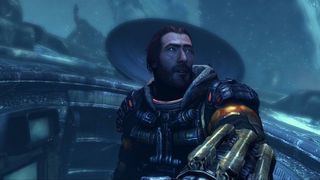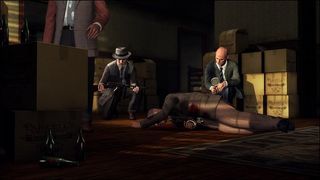There's this great moment in the criminally underrated Lost Planet 3. You play as Jim Peyton, a blue collar worker who leaves behind Grace, his pregnant wife, to go work on the distant planet E.D.N. III. Jim spends the majority of his time in his Rig, a giant walking mech specifically designed to perform menial tasks that would otherwise be impossible for humans on this frigid ice planet - repairing fuel lines, smacking rubble out of the way and the like.
The job is incredibly dangerous, filled with an endless array of hazards and massive territorial insects, but after a while, it becomes routine. Dull, tedious routine punctuated by brief life-or-death moments. To fill in the gaps, Jim sends messages back and forth with his wife, currently living millions of miles away back on Earth. They start out awkward, as both Jim and Grace try to figure out how to talk to each other in these short monologues, but after a while, that becomes routine, too. These little videos play periodically as you trudge from one job to the next, and they bring with them a humanity sorely lacking in action-packed games like these.

Jim is leaned back in his chair, sipping on his coffee and watching the latest video message from his wife. She goes on about how she's slowly losing her mind without anyone else in the house to talk to: "Today, I spent the better part of 20 minutes looking for a hat… that I was wearing. This week, I found my keys in the door - on the outside, of course - my slippers in the shower, and my toothbrush… in the refrigerator." Jim, of course, is smiling, laughing - and as soon as it ends, he immediately replays it.
It's such a small moment in the scheme of things (especially when things on E.D.N. III go, as they say, "to shit"), but it really hammers home one point in particular: Jim Peyton is just a dude with a job, trying to earn a paycheck for his family. His job may be on a distant planet, and the planet may be infested with glowing bugs, but he's not a super-soldier, he doesn't have special powers, and his existence is a mere speck on this unforgiving rock. And it brings attention to how few games are about everyday people dealing with ordinary (and sometimes extraordinary) problems, and how there's an untapped well of narrative possibilities for big-budget video games to explore.
It's certainly no secret that video games, especially the big, AAA ones, find inspiration in summer blockbuster films. There's definitely a thrill in actually getting to play games inspired by complex Hollywood-style set-pieces, but developers also tend to forget that there other genres out there that do just as well at the box office. Like comedy. Drama. Romance. Stories about people interacting with each other or overcoming odds that don't involve saving the world. Movies are currently catering to a wider variety of tastes in an industry where popcorn flicks like Jurassic World co-exist alongside more intimate character studies like the upcoming biopic Steve Jobs, and there's no reason why games can't do the same.

That's not to say that every game needs to be some indie quote-unquote "walking simulator" to provide more intimate human drama. Look at Lost Planet 3: it's set in the far-flung future, on a planet outside this solar system, and it's filled with glowing orange bugs. But the scale of Lost Planet 3 feels more personal, more intimate, and more relatable because it's about a guy trying to provide for his family. Lost Planet 3 isn't a non-stop rollercoaster of violence and spectacle. It spends the majority of its first half simply letting you be a space miner, earning cash for taking on odd jobs around the base and harvesting thermal energy to send back to Earth. It takes time to show these small, seemingly insignificant conversations between Jim and his wife. So when Jim's routine finally takes a turn for the worse, that moment is far more impactful. Despite its futuristic setting, it feels grounded because the stakes are smaller but no less real or important.
Or look at Rockstar's LA Noire. You play as Cole Phelps, a World War 2 vet and freshly-hired beat cop, who quickly works his way up the ranks at the LAPD. The cases start out mundane, as you investigate robberies or domestic abuse cases, but they're no less interesting than the series of more complex murder cases you end up working. And in the background, we see a man struggling with infidelity, a checkered past, all while an insurance fraud scheme bubbles underneath the surface. Taken separately these individual moments may not be terribly interesting, but when taken as a whole, it becomes the story of one man's attempts to atone for his sins through his steadfast approach to his casework, and it's such an earnest attempt to make Cole an actual person instead of an unblinking law machine that it almost makes up for the lackluster gunplay and flawed interrogation sequences (almost).

Even Uncharted gets in on the "ordinary person" action, especially in the third entry. While Drake's Deception is narratively all over the place, it establishes a consistent tone throughout the game: that maybe the unflappable everyman action hero has some demons, and the events of the previous two games are finally catching up to him. Nathan Drake is used to having ancient ruins fall apart around him, but in Uncharted 3, we learn that his marriage with Elena has fallen apart because Drake can't let go of his thirst for adventure. It's a surprisingly human moment for a game that throws Drake on crumbling cruise ship for no reason, and it's a moment that makes him infinitely more relatable than a hundred witty quips.
Games feel like they're always in this never-ending war of escalation, of trying to provide bigger and badder power fantasies than everything that came before, but these games prove that it's possible for big-budget experiences to portray the lives of ordinary people dealing with ordinary problems in interesting ways. When games focus too much on explosions and super powers, they forget that there's drama to be found in smaller moments, between normal everyday people - even if they're stuck on a planet light years away from home.

